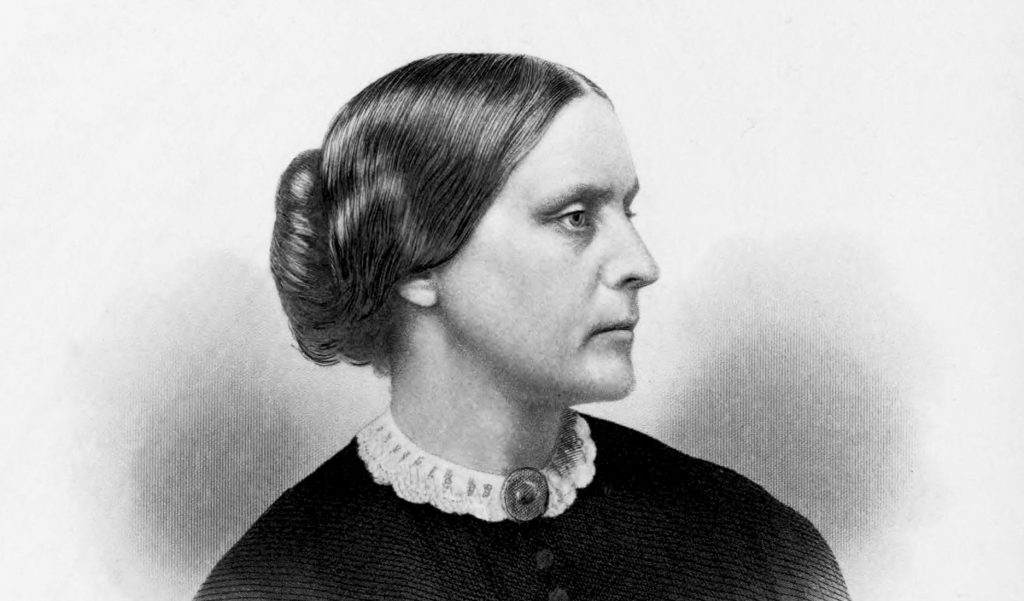
Published August 21, 2020
On Monday, President Donald Trump had political pundits, internet news sites and conservative and liberal talk shows buzzing. While speaking with reporters on Air Force One, Trump gave a vague indication something big would be happening — but that he couldn’t say what it was. “Doing a pardon tomorrow on someone who is very, very important,” he said. The media was more than intrigued, and rumors began to fly. Would it be Michael Flynn, his former national security advisor? Or perhaps Edward Snowden, the former CIA employee who leaked highly classified documents? Speculation ran into the late hours of the night.
Tuesday morning’s announcement came as a surprise — even to those in the White House Press Corps. Trump’s presidential pardon was given neither Flynn nor Snowden but, rather, to Susan B. Anthony for having been convicted in 1873 on the charge of having voted illegally.
Susan Brownell Anthony (1820-1906) was a leader in the suffragette movement, but she was also an active abolitionist (her father and Frederick Douglass were friends) and a champion of the fair treatment of workers. Raised as a devout Quaker, Anthony was committed to nonviolent solutions to social problems and readily embraced the Quaker belief of equality of all men and women, and all races, before God.
She was not allowed to testify at her trial, and the judge not only blocked the all-male jury from voting, he directed them to find her guilty after her lawyer had presented her defense. In her diary that evening, Anthony described the trial as a “mere farce” and “the greatest judicial outrage history has ever recorded,” noting that if the jury had been allowed to vote, she likely would have been acquitted. Anthony was fined $100, although she steadfastly refused to pay the fine, telling the judge, “not a penny shall go to this unjust claim.” However, the conviction was never expunged from her record. So Trump cleared her name, on the 100th anniversary of the passage of the 19th Amendment, which gave women the right to vote.
At sentencing, the judge asked Anthony if she had anything to say — a question he likely later regretted asking. She gave a stirring argument for the case of women’s suffrage, even though the judge asked her several times to sit down. “I shall earnestly and persistently continue to urge all women to the practical recognition of the old revolutionary maxim, that ‘Resistance to tyranny is obedience to God,’” she concluded before being ushered out of the courtroom.
Susan B. Anthony’s parting words to the judge paraphrased those of English martyr St. Thomas More, who said, “I remain the king’s good servant, but God’s first.” Anthony believed that by directly challenging unjust laws, she was not just being a good citizen of the United States, but she was remaining obedient to God, who created both man and woman in his image and likeness.
It is perhaps this quality — the ability to see the unique dignity of each human being — that also made Anthony and many of her fellow suffragettes passionate defenders of the unborn and outspoken critics of abortion. At Anthony’s pardoning ceremony at the White House was Marjorie Dannenfelser of the eponymous Susan B. Anthony List, a pro-life political action and education organization that is committed to supporting pro-life candidates at the national level.
Although unborn children were still legally protected in Anthony’s time, thinly veiled ads for abortion — both surgical procedures and abortifacients — could still be found in periodicals and provided a lucrative source of income for publishers. Despite the fact that Anthony’s newspaper, The Revolution, was not financially successful (it eventually went bankrupt) and Anthony desperately needed the revenue, she refused to accept ads for abortion procedures or abortion-inducing drugs. Parker Pillsbury, the paper’s co-editor, explained: “When conductors of public journals are so poor in pocket and principle as to lend themselves to so foul a work, they should be read always between their lines. They and their advertising patrons in such business should be read out of their occupation by a wholesome regard for the moral and material health of the community. … Foeticides and infanticides should be classed together and regarded with shuddering horror by the whole human race.”
Anthony and her editors instead featured the writings of other pro-life feminists, serializing 18th-century English writer Mary Wollstonecraft’s “A Vindication of the Rights of Woman.” Wollstonecraft (the mother of Mary Godwin Shelley, author of “Frankenstein”) condemned expectant mothers who “either destroy the embryo in the womb, or cast it off when born,” noting, “Nature in everything demands respect, and those who violate her laws seldom violate them with impunity.” The Revolution also published the writings of Elizabeth Cady Stanton, a champion not only of a woman’s right to vote but also of the rights of mothers to care for their children without outside interference. Like Anthony, Stanton abhorred abortion, asserting that it was simply another symptom of male domination. She wrote to Julia Ward Howe, “When we consider that women are treated as property, it is degrading to women that we should treat our children as property to be disposed of as we see fit.”
Trump’s pardon was coordinated to commemorate the 100th anniversary of the passing of the 19th Amendment (which Anthony sadly did not live to see), drawing attention to the fact that women were once unable to vote even in local elections. Today’s pro-life feminists, working to restore to the unborn their recognition and protection under the law, continue to look to Susan B. Anthony’s example — and her unwavering belief in the dignity of all.
Mary Hallan FioRito is an attorney and the Cardinal Francis George Fellow at the Ethics and Public Policy Center in Washington, D.C., and the deNicola Center for Ethics and Culture at the University of Notre Dame. She writes from Chicago.







